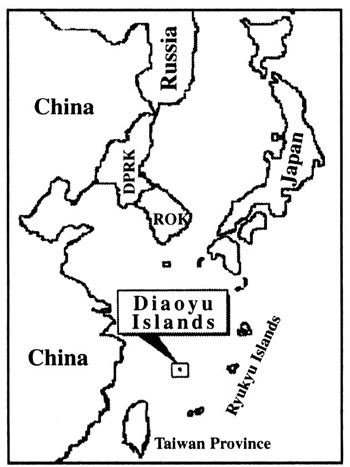Japan must relinquish expansionist past
- By Tim Collard
 0 Comment(s)
0 Comment(s) Print
Print E-mail China.org.cn, September 2, 2012
E-mail China.org.cn, September 2, 2012
|
|
|
The Diaoyu Islands, in the East China Sea between China and Japan, include some small islands and reefs, with the Diaoyu Island the largest one covering an area of five square kilometers. The islands are 120 nautical miles northeast of Taiwan, 200 nautical miles east of China's mainland and 200 nautical miles west of Japan's Okinawa. |
Small islands can cause big trouble. We in Britain know about this, as thirty years ago we fought a war over the sovereignty of a small group of islands which may or may not have oil reserves somewhere near them. Needless to say, this was not about oil or any other resources but a response to an unwarranted attack on our territory. Sound familiar?
A few weeks ago I wrote on the Nansha/Spratly Islands contretemps, saying that although I was not qualified to comment on international law, the Chinese government's declared policy of seeking common peaceful development while reserving its position on sovereignty was the right one. Now a similar-looking dispute has arisen concerning another group of islands somewhat further north. But is the position really similar?
I am, of course, referring to the islands which China calls Diaoyu and Japan calls Senkaku. I emphasize that I write this from the point of view of a foreign observer in the hopes of convincing people that the reasoning which follows is objective.
My background is in diplomacy, not in international law, and I am not well versed in the Law of the Sea, except to say that, like much international law, it is subject to a plethora of conflicting interpretations. So I cannot comment on whether there are legal differences between the Nansha/Spratly dispute and the Diaoyu/Senkaku one. But, diplomatically speaking, there is a crucial difference.
Nansha is a very remote island group which has been visited by a large variety of seafaring folk, leading to many competing claims. Diaoyu/Senkaku is different. The historical record suggests that, in the 500 years since they were first mentioned, they were regarded as belonging to the Chinese cultural sphere. I do not think that the historical record is the absolute determining factor: if territorial claims were made on the basis of who owned what hundreds of years ago, the world would be in a state of perpetual war.
The Japanese claim to the islands dates back to their formal annexation in 1895. Everyone in East Asia knows the significance of that date; it was the start of the notorious Japanese expansionist push, which lasted fifty years and was only ended by the atom bombs of 1945. It was not only Diaoyu/Senkaku which was occupied in 1895: Korea and Taiwan were too. Of course there were many territorial changes in the 19th and 20th centuries, and it would be stupid to carry on arguing about all of them. But the Japanese conquests in East Asia of the 1895-1945 period are a special case, and constitute an affront not just to China, but to all the countries in the region who suffered under their occupation.
Sadly, the confrontation with history has not proceeded as well in Asia as it did in Europe. Germany has made a complete break with its Nazi past, and enforces strict laws against any attempt at a Nazi revival. Furthermore, anyone showing support for Nazi ideas is shamed and ostracized by mainstream society. Unfortunately, the Japanese have been unable to make such progress. There is still quite a large minority, including some powerful and popular politicians, who deliberately fan the flames of supremacist nationalism. Clinging on to territorial claims from the expansionist era is very much part of the ultra-nationalist culture, along with denial of atrocities like Nanjing (or indeed celebration of them, like the disgraceful orgy in Zhuhai in 2003 in which hundreds of rich Japanese were invited to relive the experience of having limitless Chinese women at their disposal, carefully timed to take place on September 18th.
I don't wish to encourage hatred of the Japanese. I have met many, and not a single one was a violent supremacist. I can only say to the peaceful people of Japan, please rid yourselves of these repulsive nationalists who celebrate war, rape and subjugation, who disgrace your country and bring it the lasting enmity of its neighbors. And please accept that any territorial claims established in the 1895-1945 period must be abandoned.
The author is a columnist with China.org.cn. For more information please visit: http://www.ccgp-fushun.com/opinion/timcollard.htm
Opinion articles reflect the views of their authors, not necessarily those of China.org.cn.






